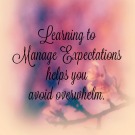Now more than ever, it’s important to remember that we all have the power to celebrate and manage our emotions. And to do that, we need to remember that we have a great deal of say over what we expose our minds and hearts to.
Emotions come from the amygdala. This is the part of the brain where reactions occur pre-thought. If we encounter something dangerous, we don’t have to think about the danger, we feel it first. It’s this response that has kept us alive as a species for thousands of years, but it can also be challenging when we become overwhelmed by the stimuli that our nervous systems are exposed to every day.
Emotional triggers are everywhere, and one of the easiest ways to understand why we feel the way we do is to look first to our past and then to our future. When you think back to certain situations where emotions were high, ask yourself the following:
-
- How did others in your household respond to emotionally challenging situations?
- How were strong emotions handled in your household?
- How were differing emotions dealt with in your household?
- How did you want to respond – and could you – based on the answers to the previous questions?
Were you raised by or often around people who often expressed strong emotions? If so, did those reactions scare you or fire you up? Did you agree with those reactions, or did they seem overly dramatic to you? More importantly, were you comfortable sharing that you disagreed, or did you know to keep your mouth shut out of fear?
Over time, repeated strong emotional reactions can become exhausting. An equally exhausting and frustrating situation can be where others aren’t reacting much at all, and yet you’re feeling angry or outraged about something. In both cases, your wellness can be compromised.
The trick is to remember that you can manage your emotions, much like you would manage the rest of your health. Here are three tips to help.
Feel All the Feels and Express Them Appropriately
One of the most challenging things about managing emotions is not only feeling them but also expressing those feelings appropriately. And another wrench in the gears is that your definition of “appropriately” may differ from other people’s definition of the same word.
By taking the time to acknowledge, name, and feel your feelings – whether they be sadness, elation, joy, sorrow, or frustration – you remove the stigma from the emotion. Feelings in and of themselves aren’t good or bad; they simply are.
Many of us were not taught to identify and name our feelings as young people. Instead, we were taught that feeling angry or sad was “bad.” Therefore, we weren’t encouraged to feel and process those emotions. By accepting and naming your emotions and working on how you can express them appropriately (journaling, going for a run, working out, singing, dancing, talking to a trusted friend), you can manage and process them effectively.
The first step is always admitting that you feel a certain way and then not shying away from that feeling. Avoiding emotions that may not feel good doesn’t help you in the long run. Working with these emotions and admitting you feel them should be an act of celebration, not shame. By staying with your feelings, you can eventually learn to manage them in healthy ways.
Get Cozy with Resilience
Life isn’t going to be fair, and the world doesn’t owe us anything. If we’ve been knocked down repeatedly, at some point, it can be really tough to get up again. It’s in these moments of wanting to stay down that resilience becomes critical.
Being resilient helps us manage emotions because it helps us focus on what cannot be taken away. The power we have over our thoughts, circumstances, and responses is incredible! When we learn to harness that power along with learning how to manage what we expose our minds and hearts to (through good friend choices, healthy boundaries in relationships, doing meaningful work, and limits on technology use), we strengthen our resilience muscle.
It’s important to remember that being resilient doesn’t mean avoiding or denying feeling disappointed, discouraged, or being in despair. It means we acknowledge those feelings and work through them and then decide how to move forward and take the next step.
Getting cozy with resilience allows us to feel the feels, learn what we need to know, and then move forward with wisdom and bravery. It doesn’t mean we do all this by ourselves, but it does mean that we repeatedly take the actions we need to take to move ourselves forward instead of staying in a place of blame, entitlement, and bitterness.
Embrace Emotional Maturity
Feeling all the feels, expressing them appropriately, and becoming more resilient all result in emotional maturity. One of the challenges of “cancel culture” is that there seems to be so much outrage over everything. Not only is this dangerous, but it’s also needlessly exhausting.
While certain things do merit strong reactions and immediate responses, the emotionally mature person learns how to discern what is truly worthy of those responses and reactions. By being able to discern what merits a particular response, you’re able to use your precious mental, emotional, and physical energy more effectively.
Emotionally mature people understand how to manage and express emotions in ways that are appropriate and understood. They learn how not to let their emotions derail their thoughts, habits, and success.
You have the power over what you expose your mind and heart to, and how you respond to any given situation. By feeling your feels and expressing them appropriately, working on strengthening your resilience muscle, and embracing emotional maturity, you can stay happy and healthy in both good and challenging times.






